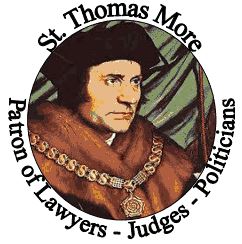
“The King’s good servant, but God’s first.”1 Thomas More was born in Milk Street, London on February 7, 1478, son of Sir John More, a prominent judge. He was educated at St Anthony’s School in London. As a youth he served as a page in the household of Archbishop Morton, who anticipated More would become a “marvellous man.”1 More went on to study at Oxford underThomas Linacre and William Grocyn. During this time, he wrote comedies and studied Greek and Latin literature. One of his first works was an English translation of a Latin biography of the Italian humanist Pico della Mirandola. It was printed by Wynkyn de Worde in 1510.
Around 1494 More returned to London to study law, was admitted to Lincoln’s Inn in 1496, and became a barrister in 1501. Yet More did not automatically follow in his father’s footsteps. He was torn between a monastic calling and a life of civil service. While at Lincoln’s Inn, he determined to become a monk and subjected himself to the discipline of the Carthusians, living at a nearby monastery and taking part of the monastic life. The prayer, fasting, and penance habits stayed with him for the rest of his life. More’s desire for monasticism was finally overcome by his sense of duty to serve his country in the field of politics. He entered Parliament in 1504, and married for the first time in 1504 or 1505, to Jane Colt.2 They had four children: Margaret, Elizabeth, Cicely, and John. More became a close friend with Desiderius Erasmus during the latter’s first visit to England in 1499. It was the beginning of a lifelong friendship and correspondence. They produced Latin translations of Lucian’s works, printed at Paris in 1506, during Erasmus’ second visit. On Erasmus’ third visit, in 1509, he wrote Encomium Moriae, or Praise of Folly, (1509), dedicating it to More. One of More’s first acts in Parliament had been to urge a decrease in a proposed appropriation for King Henry VII. In revenge, the King had imprisoned More’s father and not released him until a fine was paid and More himself had withdrawn from public life. After the death of the King in 1509, More became active once more. In 1510, he was appointed one of the two under-sheriffs of London. In this capacity, he gained a reputation for being impartial, and a patron to the poor. In 1511, More’s first wife died in childbirth. More soon married again, to Alice Middleton. They did not have children. During the next decade, More attracted the attention of King Henry VIII. In 1515 he accompanied a delegation to Flanders to help clear disputes about the wool trade.Utopia opens with a reference to this very delegation. More was also instrumental in quelling a 1517 London uprising against foreigners, portrayed in the play Sir Thomas More, possibly by Shakespeare. More accompanied the King and court to the Field of the Cloth of Gold. In 1518 he became a member of the Privy Council, and was knighted in 1521. More helped Henry VIII in writing his Defence of the Seven Sacraments, a repudiation of Luther, and wrote an answer to Luther’s reply under a pseudonym. More had garnered Henry’s favor, and was made Speaker of the House of Commons in 1523 and Chancellor of the Duchy of Lancaster in 1525. As Speaker, More helped establish the parliamentary privilege of free speech. He refused to endorse King Henry VIII’s plan to divorce Katherine of Aragón (1527). Nevertheless, after the fall of Thomas Wolsey in 1529, More became Lord Chancellor, the first layman yet to hold the post. While his work in the law courts was exemplary, his fall came quickly. He resigned in 1532, citing ill health, but the reason was probably his disapproval of Henry’s stance toward the church. He refused to attend the coronation of Anne Boleyn in June 1533, a matter which did not escape the King’s notice. In 1534 he was one of the people accused of complicity with Elizabeth Barton, the nun of Kent who opposed Henry’s break with Rome, but was not attainted due to protection from the Lords who refused to pass the bill until More’s name was off the list of names.3 In April, 1534, More refused to swear to the Act of Succession and the Oath of Supremacy, and was committed to the Tower of London on April 17. More was found guilty of treason and was beheaded alongside Bishop Fisher on July 6, 1535. More’s final words on the scaffold were: “The King’s good servant, but God’s First.” More was beatified in 1886 and canonized by the Catholic Church as a saint by Pope Pius XI in 1935. 1. Last words on the scaffold, 1535, according to Paris Newsletter, August 4, 1535: Other local biographical resources: Bibliography: Article Citation: Jokinen, Anniina. “The Life of Sir Thomas More.” Luminarium.
Site copyright ©1996-2012 Anniina Jokinen. All Rights Reserved. |
|

